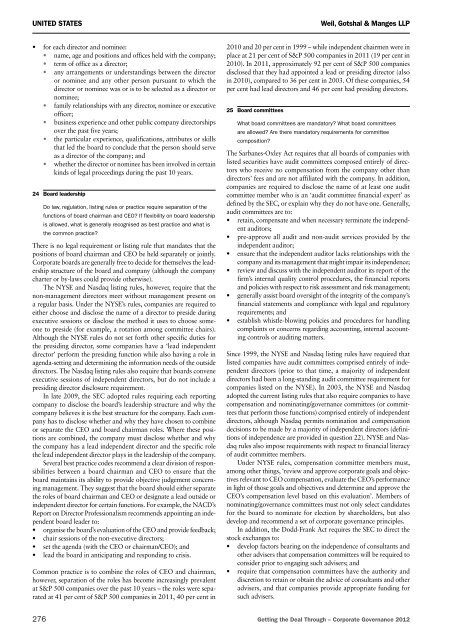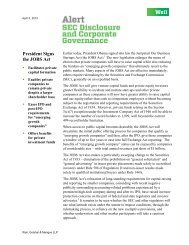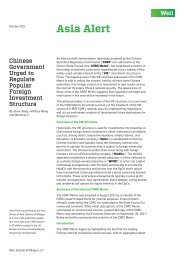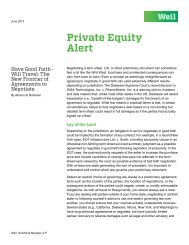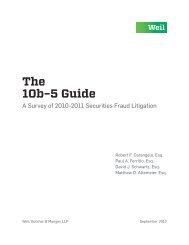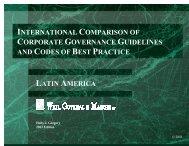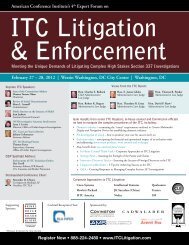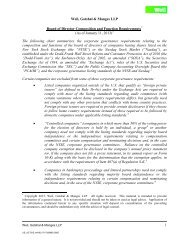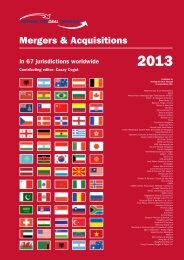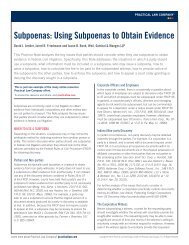Corporate Governance - Weil, Gotshal & Manges
Corporate Governance - Weil, Gotshal & Manges
Corporate Governance - Weil, Gotshal & Manges
You also want an ePaper? Increase the reach of your titles
YUMPU automatically turns print PDFs into web optimized ePapers that Google loves.
United States<br />
<strong>Weil</strong>, <strong>Gotshal</strong> & <strong>Manges</strong> LLP<br />
• for each director and nominee:<br />
• name, age and positions and offices held with the company;<br />
• term of office as a director;<br />
• any arrangements or understandings between the director<br />
or nominee and any other person pursuant to which the<br />
director or nominee was or is to be selected as a director or<br />
nominee;<br />
• family relationships with any director, nominee or executive<br />
officer;<br />
• business experience and other public company directorships<br />
over the past five years;<br />
• the particular experience, qualifications, attributes or skills<br />
that led the board to conclude that the person should serve<br />
as a director of the company; and<br />
• whether the director or nominee has been involved in certain<br />
kinds of legal proceedings during the past 10 years.<br />
24 Board leadership<br />
Do law, regulation, listing rules or practice require separation of the<br />
functions of board chairman and CEO If flexibility on board leadership<br />
is allowed, what is generally recognised as best practice and what is<br />
the common practice<br />
There is no legal requirement or listing rule that mandates that the<br />
positions of board chairman and CEO be held separately or jointly.<br />
<strong>Corporate</strong> boards are generally free to decide for themselves the leadership<br />
structure of the board and company (although the company<br />
charter or by-laws could provide otherwise).<br />
The NYSE and Nasdaq listing rules, however, require that the<br />
non-management directors meet without management present on<br />
a regular basis. Under the NYSE’s rules, companies are required to<br />
either choose and disclose the name of a director to preside during<br />
executive sessions or disclose the method it uses to choose someone<br />
to preside (for example, a rotation among committee chairs).<br />
Although the NYSE rules do not set forth other specific duties for<br />
the presiding director, some companies have a ‘lead independent<br />
director’ perform the presiding function while also having a role in<br />
agenda-setting and determining the information needs of the outside<br />
directors. The Nasdaq listing rules also require that boards convene<br />
executive sessions of independent directors, but do not include a<br />
presiding director disclosure requirement.<br />
In late 2009, the SEC adopted rules requiring each reporting<br />
company to disclose the board’s leadership structure and why the<br />
company believes it is the best structure for the company. Each company<br />
has to disclose whether and why they have chosen to combine<br />
or separate the CEO and board chairman roles. Where these positions<br />
are combined, the company must disclose whether and why<br />
the company has a lead independent director and the specific role<br />
the lead independent director plays in the leadership of the company.<br />
Several best practice codes recommend a clear division of responsibilities<br />
between a board chairman and CEO to ensure that the<br />
board maintains its ability to provide objective judgement concerning<br />
management. They suggest that the board should either separate<br />
the roles of board chairman and CEO or designate a lead outside or<br />
independent director for certain functions. For example, the NACD’s<br />
Report on Director Professionalism recommends appointing an independent<br />
board leader to:<br />
• organise the board’s evaluation of the CEO and provide feedback;<br />
• chair sessions of the non-executive directors;<br />
• set the agenda (with the CEO or chairman/CEO); and<br />
• lead the board in anticipating and responding to crisis.<br />
Common practice is to combine the roles of CEO and chairman,<br />
however, separation of the roles has become increasingly prevalent<br />
at S&P 500 companies over the past 10 years – the roles were separated<br />
at 41 per cent of S&P 500 companies in 2011, 40 per cent in<br />
2010 and 20 per cent in 1999 – while independent chairmen were in<br />
place at 21 per cent of S&P 500 companies in 2011 (19 per cent in<br />
2010). In 2011, approximately 92 per cent of S&P 500 companies<br />
disclosed that they had appointed a lead or presiding director (also<br />
in 2010), compared to 36 per cent in 2003. Of these companies, 54<br />
per cent had lead directors and 46 per cent had presiding directors.<br />
25 Board committees<br />
What board committees are mandatory What board committees<br />
are allowed Are there mandatory requirements for committee<br />
composition<br />
The Sarbanes-Oxley Act requires that all boards of companies with<br />
listed securities have audit committees composed entirely of directors<br />
who receive no compensation from the company other than<br />
directors’ fees and are not affiliated with the company. In addition,<br />
companies are required to disclose the name of at least one audit<br />
committee member who is an ‘audit committee financial expert’ as<br />
defined by the SEC, or explain why they do not have one. Generally,<br />
audit committees are to:<br />
• retain, compensate and when necessary terminate the independent<br />
auditors;<br />
• pre-approve all audit and non-audit services provided by the<br />
independent auditor;<br />
• ensure that the independent auditor lacks relationships with the<br />
company and its management that might impair its independence;<br />
• review and discuss with the independent auditor its report of the<br />
firm’s internal quality control procedures, the financial reports<br />
and policies with respect to risk assessment and risk management;<br />
• generally assist board oversight of the integrity of the company’s<br />
financial statements and compliance with legal and regulatory<br />
requirements; and<br />
• establish whistle-blowing policies and procedures for handling<br />
complaints or concerns regarding accounting, internal accounting<br />
controls or auditing matters.<br />
Since 1999, the NYSE and Nasdaq listing rules have required that<br />
listed companies have audit committees comprised entirely of independent<br />
directors (prior to that time, a majority of independent<br />
directors had been a long-standing audit committee requirement for<br />
companies listed on the NYSE). In 2003, the NYSE and Nasdaq<br />
adopted the current listing rules that also require companies to have<br />
compensation and nominating/governance committees (or committees<br />
that perform those functions) comprised entirely of independent<br />
directors, although Nasdaq permits nomination and compensation<br />
decisions to be made by a majority of independent directors (definitions<br />
of independence are provided in question 22). NYSE and Nasdaq<br />
rules also impose requirements with respect to financial literacy<br />
of audit committee members.<br />
Under NYSE rules, compensation committee members must,<br />
among other things, ‘review and approve corporate goals and objectives<br />
relevant to CEO compensation, evaluate the CEO’s performance<br />
in light of those goals and objectives and determine and approve the<br />
CEO’s compensation level based on this evaluation’. Members of<br />
nominating/governance committees must not only select candidates<br />
for the board to nominate for election by shareholders, but also<br />
develop and recommend a set of corporate governance principles.<br />
In addition, the Dodd-Frank Act requires the SEC to direct the<br />
stock exchanges to:<br />
• develop factors bearing on the independence of consultants and<br />
other advisers that compensation committees will be required to<br />
consider prior to engaging such advisers; and<br />
• require that compensation committees have the authority and<br />
discretion to retain or obtain the advice of consultants and other<br />
advisers, and that companies provide appropriate funding for<br />
such advisers.<br />
276 Getting the Deal Through – <strong>Corporate</strong> <strong>Governance</strong> 2012


